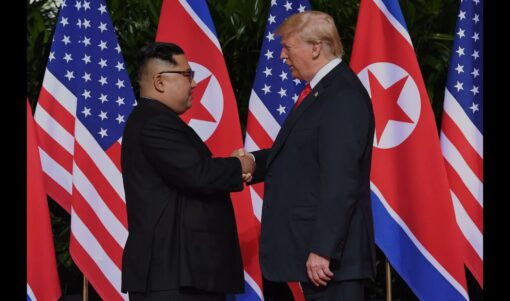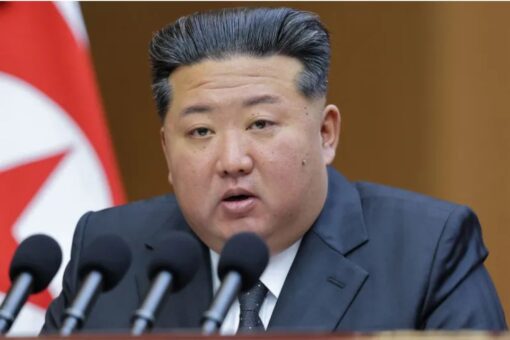North Korea’s leader Kim Jong Un has declared he is open to restarting dialogue with Washington, but only if the United States abandons what he called its “unrealistic and hostile” demands for unilateral denuclearization.
The remarks, delivered during a policy meeting in Pyongyang, mark the first time in months that Kim has directly addressed the question of relations with the US, and they highlight both the possibility of renewed diplomacy and the enduring stalemate that has defined the relationship since talks broke down in 2019.
The North Korea US talks have been stalled for years following a brief period of high-profile summits between Kim and then-President Donald Trump.
Those meetings, which included the historic 2018 Singapore summit, raised hopes that the two countries might achieve a breakthrough.
Instead, disagreements over sanctions relief and the sequencing of denuclearization steps caused negotiations to collapse, leaving the Korean Peninsula in a state of simmering tension.
Kim’s latest remarks suggest he remains interested in dialogue, but on terms that diverge sharply from Washington’s long-standing position.
“We are not opposed to dialogue itself, but we cannot accept demands that threaten our sovereignty or demand we disarm unilaterally while receiving nothing in return,” he was quoted as saying by state media.
His comments make clear that Pyongyang seeks recognition as a nuclear state, even as it holds out the possibility of negotiations on other security issues.
The United States has repeatedly insisted that any future engagement must be centered on denuclearization.
Successive administrations, both Republican and Democratic, have described North Korea’s nuclear arsenal as unacceptable, warning that it poses a direct threat to regional and global stability.

A State Department spokesperson, responding to Kim’s latest statement, reiterated that Washington’s policy “remains focused on the complete denuclearization of the Korean Peninsula,” but added that the US is prepared to engage in talks “without preconditions.”
Analysts see a familiar pattern in these exchanges. By expressing conditional openness to dialogue, Pyongyang signals flexibility while simultaneously rejecting the central demand that has defined decades of negotiations.
“Kim Jong Un is essentially telling the US: if you drop denuclearization, then we can talk,” explained one Korea expert in Seoul. “But the United States is unlikely to abandon that demand, so the stalemate continues.”
Nevertheless, Kim’s words carry significance at a time of heightened tensions. North Korea has conducted a series of missile tests this year, including launches of intercontinental ballistic missiles capable of striking the US mainland.
These tests have drawn condemnation from Washington, Tokyo, and Seoul, which have increased military cooperation in response. By hinting at the possibility of North Korea US talks, Kim may be attempting to ease international pressure, or to extract concessions without giving up his nuclear arsenal.
Regional governments reacted cautiously to the remarks. South Korea’s presidential office said it was monitoring the situation closely but stressed that denuclearization must remain the ultimate goal of any dialogue.
Japan’s prime minister echoed that sentiment, calling Kim’s conditions “unacceptable” but urging continued diplomatic coordination among allies. China, North Korea’s most important partner, welcomed the possibility of renewed talks, urging both sides to show flexibility.
For North Korea, the nuclear program is seen not just as a bargaining chip but as essential to regime survival.
Kim emphasized that point in his speech, declaring that “our nuclear weapons are the sword that protects our nation” and suggesting they are non-negotiable.
Still, by framing the issue around US “hostile policy,” Pyongyang leaves open the possibility that concessions such as sanctions relief or reductions in military exercises could pave the way for talks on security guarantees.
One former US diplomat familiar with past negotiations described the remarks as part of a long-standing North Korean strategy.
“Pyongyang has always tried to shift the conversation away from denuclearization and toward arms control or recognition,” he said. “Kim’s statement is the latest version of that strategy—invite talks, but on terms that Washington cannot easily accept.”
Public opinion within South Korea has also been shaped by fatigue with the cycle of hope and disappointment. Many South Koreans vividly remember the optimism that followed the 2018 summits, when both sides spoke of peace, reconciliation, and even the possibility of formally ending the Korean War.
That optimism evaporated after the 2019 Hanoi summit collapsed without agreement, and relations have since returned to hostility.
A Seoul-based academic commented that “people here are skeptical that any North Korea US talks can produce results. They’ve seen too many false dawns.”
Washington’s approach under President Joe Biden has been described as “calibrated diplomacy,” meaning an openness to talks but without the dramatic gestures seen under Trump.
Biden administration officials say they are willing to meet North Korean counterparts anytime and anywhere, but only to discuss the path toward denuclearization.
Pyongyang has largely ignored those offers, dismissing them as insincere while ramping up its weapons program. Kim’s latest remarks suggest that unless the US shifts its stance, the deadlock will continue.
The timing of Kim’s statement may also be linked to domestic factors. North Korea is grappling with economic hardships, worsened by international sanctions, the pandemic, and recent natural disasters.
By signaling openness to dialogue, Kim could be trying to ease international isolation while projecting an image of strength to his domestic audience.
“This is classic dual messaging,” said a researcher at a think tank in Tokyo. “Externally, Kim wants to look flexible. Internally, he wants to show his people that North Korea will never bow to outside pressure.”
Despite the obstacles, some analysts argue that Kim’s words should not be dismissed outright. Even if Pyongyang is not willing to give up its nuclear arsenal, there could be space for talks on arms control, crisis management, or humanitarian cooperation.
“The reality is that North Korea is a nuclear state, whether the US admits it or not,” said one expert. “The choice is between engaging them to reduce risks, or allowing tensions to escalate indefinitely.”
Critics of Washington’s approach argue that insisting on full denuclearization as a precondition for meaningful progress has failed repeatedly.
They point to the decades-long history of negotiations, during which North Korea’s arsenal has only grown. Some suggest that exploring interim steps, such as freezing weapons tests or limiting production, could be more realistic.
Yet such proposals remain controversial, as they could be seen as legitimizing North Korea’s nuclear status.
In Pyongyang, Kim concluded his remarks by reiterating that North Korea would never accept demands that compromise its sovereignty.

“We are a proud and independent nation,” he said. “If the United States truly seeks peace, it must abandon its hostile policy and respect us as equals.” The statement encapsulates the dilemma at the heart of the issue: Pyongyang demands recognition and concessions, while Washington demands disarmament.
As the world reacts to Kim’s latest comments, the future of the North Korea US talks remains uncertain. Optimists hope that even conditional willingness to engage could open a narrow window for diplomacy, while skeptics see only a familiar pattern of posturing and deadlock.
What is clear is that the Korean Peninsula remains one of the most volatile flashpoints in global security, and that the question of dialogue—or the lack of it—will continue to shape the region’s future.


